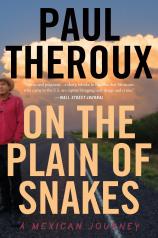On the Plain of Snakes: A Mexican Journey
Review
On the Plain of Snakes: A Mexican Journey
- Click here to read Rebecca Kilberg's review.
My mother, the daughter of an Irish immigrant, once declared that I inherited the itchy feet of the traveler, paddling me once again for wandering off. I was nine when I first set foot on foreign soil after we packed up on December 22nd for a three-day drive from snowy Iowa to New Mexico, the mythical Land of Enchantment. It was Christmas! Who wants to go to some dusty place where no one spoke English and didn’t even put up Christmas trees? My sister, Phyllis, a drama major at the University of New Mexico, had fallen in love with the ambiance of the region, and my itchy-footed mother thought it would be fun to spend the holiday break with her.
So mom, dad and I picked up Phyllis at her dorm, and set off for the Mexican border in El Paso to cross into Juarez, Mexico, on Christmas Eve. We stopped to eat odd-looking food that I grudgingly agreed was delicious, then rode through a wonderland as my sister described the adobe casas, alien to our pointy roofs and front porches. Instead of chains of lights on sloping eaves, the flat rooftops were adorned with luminarias --- candles settled in a nest of sand inside paper bags. We watched as parades of families, candles lit, approached an ancient church that looked like a castle from my storybooks. It was, indeed, a land of enchantment. I was hooked, wanting to see more.
As adults with three kids, we dragged a camping tent on wheels all over the western states, often spending Christmases in Arizona where my parents had retired. We, too, moved to Arizona after retirement, and we joke that we made the mistake of sending our grown children our address, because they followed suit. We have crossed that border dozens of times over the years --- no muss, no fuss. Show your ID, drive to Rocky Point to camp on the beach or rent a house, make the rum run to Nogales for cheap-priced liquor and honest-to-God Mexican food instead of the local fast food.
"His style is to deep dive into the culture, arts and history of the countries he visits. Any travel writer worth his or her salt can do this, but Theroux’s approach is to spend time meeting and talking with locals..."
It was more complicated after 2001, and getting into Mexico was akin to traveling to other foreign nations, requiring a passport or visa. For years we put up with the security regulations for foreign travel, even after it got so expensive and my itchy traveler’s feet grew weary of the stone stairways of the old world. Our traveling days were over, but by then we had touched base in five of seven continents, so now we fall back on armchair travel. Our personal favorites are Bill Bryson and Paul Theroux.
The Mexico that Theroux traverses in ON THE PLAIN OF SNAKES from the US border to its southern tip in 2019 is a far cry from that placid scenario we encountered in the mid-20th century. His style is to deep dive into the culture, arts and history of the countries he visits. Any travel writer worth his or her salt can do this, but Theroux's approach is to spend time meeting and talking with locals about their jobs, lifestyle, local politics and, in this --- his second book about Mexico --- political pressures from their once-friendly North American neighbor, the USA.
Theroux sets out alone in his SUV, fully acknowledging his advancing age but relying on his vast experience in circumnavigating the globe, chronicled in 19 books. He decides to drive along the south side of the boundary, some of it walled, from the Texas gulf to California, a trip of almost 2,000 miles. The first segment of the book is called “Borderlands,” and if you could find a map of this relatively narrow strip, it should contain a warning like the logs of the ancient mariner, illustrated with “Here be dragons.” Ignoring the warning of a man familiar with the region, “Don’t go thar! You’ll dah!”, he sets off.
“Borderlands” takes up the first 100 pages. In this, the most somber section of the book, he quotes the staggering number of dead and missing at 120,000. Immigrants dying of thirst and starvation brought about by atrocities from drug cartels are a major reason for this terrifying statistic, but the police, the supposed protectors, are so corrupt that they cannot be trusted. You could be pulled over for any infraction, or even for no reason, so Theroux kept generous amounts of cash on hand to pay off the local policia whenever they flashed their lights. It was a frequent occasion because of roads being nearly impassable and signage missing or unreadable.
Theroux’s rusty college Spanish proves to be no match for the lingua franca of the various Mexican states, so midway through his trek, he pauses to take a class in Mexico City to learn the finer points of the conglomeration of ancient tongues and Spanish. This is a fortuitous choice; he makes new friends who lead him to further connections and areas of interest as he proceeds on his trek through a country ravaged by earthquakes, poverty and crime.
Theroux writes at the end of the book: “The lesson I had learned in Mexico was that, more than almost any other person I had met in my life of travel, the Mexican was diligent in his or her self-sufficiency. This strategy to survive drove them from their villages and slums to the border --- sometimes to share in the ideals of American life, but perhaps more often to toil as field hands or fruit pickers and to clean hotel rooms, grateful for the work.” Sadly, many return to their home villages to care for aging family members, only to be refused reentry to America.
ON THE PLAIN OF SNAKES arrived in stores just prior to the brutal murder of three women and six children, members of a family of the breakaway Mormon clan who had lived in a conclave in the borderlands for over 100 years.
The overwhelming question I had when reading ON THE PLAIN OF SNAKES was “Why does this book exist?” Enjoyable at times, it appears to possess a motivation most meaningful to its author. Most simply, it’s about an older white man seeking to benefit from the charms of a country by interacting with its inhabitants, thereby deriving greater truths. Paul Theroux seems to take pains at times not to be exploitative, and to acknowledge the impossibility of coming away from significant engagement and understanding of another culture in a brief period. Unfortunately, he falls short.
"Certain portraits are playful and evocative. And I appreciate that despite his advanced age, Theroux has continued to take advantage of his privileged existence as a travel writer."
Maybe my irritation began when Theroux was quizzing well-educated Mexicans with literary accomplishments on a list of white, male, American and European authors. Perhaps it was how many times he marveled at how simple it is for him to enter Mexico and how hard it is for Mexicans to leave. I suspect it was around the time of his shocking realization that parts of Mexico are plagued by gangs, corruption and violence (a fact that somehow doesn’t appear to have become salient until he was on the road), combined with his gleeful and frequent repetition of his status as an elderly gringo, sealed by the way he pulled out of a sexual encounter with what he describes as a “young girl” at the moment before money exchanges hands. Don’t get me wrong --- I didn’t expect him to go through with it. I expected him to recognize stronger boundaries between engaging people he encountered and taking advantage of them.
In any case, a book with a fair amount of interesting and vivid descriptions of unusual places accessed and portrayed was made far more bitter by the blithe attitude of its author.
Am I being unfair? Perhaps. I enjoyed learning about a town where they trade straw hats for money, as well as the dignified and lovely-sounding Zapatista hub, Oventic. Certain portraits are playful and evocative. And I appreciate that despite his advanced age, Theroux has continued to take advantage of his privileged existence as a travel writer. I have no doubt that as one ages, the bits and pieces of the world that resonate change. That change seems likely to be universal, although how it plays out is not.
Still, despite Theroux’s insistence of his status as an hombre de juicio, maybe he would have been better off attempting to hold a little less.
Reviewed by Roz Shea and Rebecca Kilberg on November 15, 2019
On the Plain of Snakes: A Mexican Journey
- Publication Date: October 6, 2020
- Genres: Memoir, Nonfiction, Travel
- Paperback: 464 pages
- Publisher: Mariner Books
- ISBN-10: 0358362792
- ISBN-13: 9780358362791




